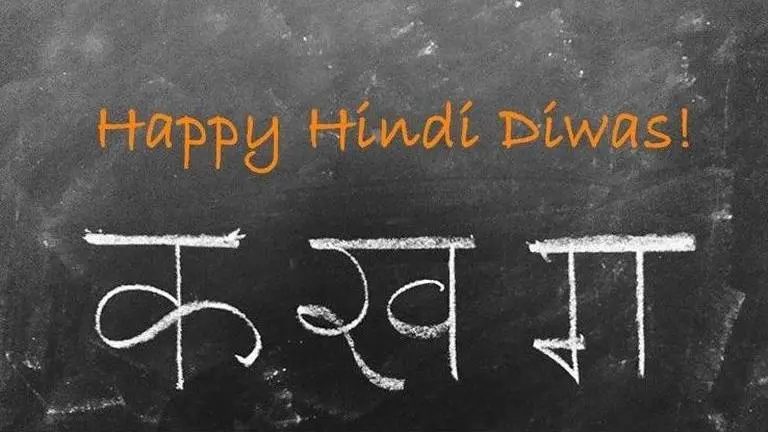Updated 14 September 2018 at 23:30 IST
Hindi Diwas celebrated with fanfare but non-Hindi speakers feel left out
September 14th is celebrated as Hindi Diwas across the country as, in 1949, Hindi became the official language of India under the Article 343.
- India News
- 0 min read

September 14th is celebrated as Hindi Diwas across the country as, in 1949, Hindi became the official language of India under the Article 343. For close to seven decades, the union government of India has been marking the day with much pomp and pageantry. The day is celebrated even on social media and programs organised to celebrate in schools, colleges, and government offices too, however, this year, it has received backlash from sections of the country, especially the non-Hindi speaking south.
Resistance has been building up against the union government for celebrating only Hindi, as language activists contend that preferential treatment for the language and its speakers excludes almost 60% of Indians who are not native-Hindi speakers. But grouse against what is now being called as a systematic 'Hindi-imposition' by the Government of India stretches beyond these events.
'In a linguistically diverse union of states like India, it would be against the principles of justice, equality and freedom, on which our constitution is founded, to impose one language on other language speakers in their own land. Unfortunately, Union government readies to celebrate this day as Hindi Diwas, also for a week as Hindi Saptaha and more recently for a fortnight as Hindi pakwada across all central government offices. This celebration is derisive on part of non-Hindi speakers of India and must be opposed,' says Vallish Kumar from Kannada Grahakara Koota.
Last year, Bengaluru saw a campaign against the use of Hindi signage in Metro rail in the city's 'Namma Metro'. This soon snowballed into a sustained anti-Hindi-imposition where organisations took up policy issues where Hindi was getting skewed antecedence. The principle of linking Hindi with all Union government projects and schemes has been called as a step-motherly treatment to non-Hindi speaking citizens.
Crusade against central examinations like Institute of Banking Personnel Selection(IBPS), Union Public Service Commission(UPSC), Staff Selection Commission(SSC) being allowed to be written by candidates in either Hindi and English have been a pursued by several organisations and movements in states like Karnataka and Tamilnadu. The demurral is that this disadvantages entrant who are not fluent in neither of the languages and will give a clear benefit to those from Hindi speaking background.
Advertisement
In 2016, RBI announced Raj Bhasha award for 'The dearth of original writing in the field of banking in Hindi was being felt for a long time. To overcome this and to promote original writing in Hindi on economic/financial topics, Governor, Reserve Bank of India announced an award scheme for “Excellent writing in the field of banking in Hindi”.' said the RBI website.
Similarly, usage of Hindi in forms provided by public sector banks and ATM, coupled with employees who can only converse in Hindi and English seems to be crippling bank customers not comfortable with either of the languages. In aircraft and trains, non-usage of local languages has raised concerns among mostly natives of southern and eastern states of India.
Advertisement
Under Article 348 (2), the Governor of the State may, with the previous consent of the President, authorize the use of the Hindi language or any other language used for any official purpose of the State, in the proceedings of the High Court having its principal seat in that State provided that decrees, judgments or orders passed by such High Courts shall be in English. But despite this provision, repeated requests to allow Tamil to be used in Madras High Court has been shunned by the center.
The role of national parties in promoting Hindi, at the cost of affront to other vernacular languages has caught the piqued many language activists.
Ganesh Chetan, a member of Banavasi Balaga says, "How can Congress & BJP claim to be pro-diversity and still support Hindi hegemony? Hindi Diwas is a black day for all those who cherish the plural and diverse nature of India. Constitutional amendments needed to stop Hindi imposition and to ensure language equality".
Between 2001 and 2011, statistics reveal that 100 million speakers of Hindi increased, thus sparking off a debate of whether, of the 22 official languages, as mandated by the constitution, is Hindi getting disproportionate attention. With trepidation of other regional languages getting marginalised, campaigns against Hindi hegemony seems to be spreading, from the fringe to mainstream. The union government's outreach to non-Hindi citizens, if not in proportion to Hindi speaking ones will further give a sense of alienation.
Published By : Pooja Prasanna
Published On: 14 September 2018 at 23:30 IST
